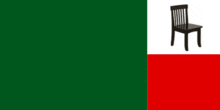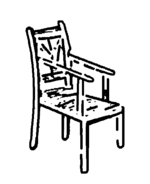Uttarakhand Kranti Dal
The Uttarakhand Kranti Dal (translation: Uttarakhand Revolutionary Party; abbr. UKD), is a registered unrecognised regional political party in Uttarakhand, India. It bills itself as the only regional party of the Uttarakhand in contrast to the national parties that dominate the state's politics.
Uttarakhand Kranti Dal | |
|---|---|
 | |
| Abbreviation | UKD |
| Leader | Kashi Singh Airy |
| President | Diwakar Bhatt |
| Founder |
|
| Founded | 26 July 1979 |
| Headquarters | Kranti Bhavan, 10 Court Road, Dehradun-248001, Uttarakhand |
| Ideology | Regionalism Protectionism Civic nationalism Democratic socialism |
| Political position | Centre-left to left-wing |
| Colours | Myrtle green |
| ECI Status | Registered Unrecognised Party |
| Alliance | Progress Democratic Front (PDF) |
| Seats in Uttarakhand Legislative Assembly | 0 / 71 |
| Election symbol | |
 | |
| Website | |
| www.uttarakhandkrantidal.in | |
In the present Uttarakhand Legislative Assembly, elected in 2017, it does not have any member as compared with one member in the previous 2012, three members in 2007 and four members in 2002 assembly elections of the state.[1]
History
The UKD was established on 26 July 1979 by Bipin Chandra Tripathi, Prof. Devi Datt Pant, Indramani Badoni and Kashi Singh Airy at Nanital to fight for a separate state composed of the hill districts of Uttar Pradesh. The founding convention was chaired by Dr. D. D. Pant, former vice-chancellor of Kumaon University. Under the young leadership of Kashi Singh Airy who took the charge of struggle and public agitation and the aim was finally achieved, when the separate Uttaranchal state was formed on 9 November 2000, later renamed Uttarakhand in 2007. However, in the first-ever state assembly elections in 2002, the party won only four out of 70 seats and was outmaneuvered by the Indian National Congress and Bharatiya Janata Party, both despite being latecomers to the Uttarakhand statehood movement, succeeded in capturing its momentum for electoral gain and formed governments in the state
So far, the UKD has not been able to achieve its ostensible goal in establishing a viable third force in Uttarakhand politics due to splits and divisions within its ranks. However, it maintains friendly relations with left parties in the state such as the Communist Party of India, Communist Party of India (Marxist), Communist Party of India (Marxist–Leninist) Liberation and the other minor parties and social movements in Uttarakhand.
The party has taken on various campaigns in the past geared towards the social and economic upliftment of the Pahari people. The party has however embraced a number of causes of concern to the diversity of people living in Uttarakhand, defining the Uttarakhandi identity in broad and inclusive terms. As such, its ideology of civic as opposed to ethnic nationalism can be compared to other centre-left nationalist parties like the Scottish National Party or Plaid Cymru, although its orientation and goals are emphatically non-secessionist.
Leadership
The party's current face is Kashi Singh Airy, a prominent leader of the Uttarakhand statehood movement and a senior leader of Uttarakhand Kranti Dal, who was elected for Uttar Pradesh Legislative Assembly three times (1985–1989, 1989–1991, 1993–1996) and was elected for first Uttarakhand Legislative Assembly. Diwakar Bhatt is the current president of UKD, with Kashi Singh Airy and Dr. Narayan Singh Jantwal as honorary presidents, the vice presidents are A. P. Juyal, Bhuwan Chandra Joshi, Beena Bahuguna and Pushpesh Tripathi—senior statehood activists and prominent faces of Uttarakhand statehood movement who fought from the forefront in the creation of Uttarakhand state. Beena Bahuguna is now elected as a Block Pramukh of Raipur, Dehradun. Jaswant Singh Bisht was the first elected MLA of the party from Ranikhet constituency. Other personalities include late Indramani Badoni and late Bipin Chandra Tripathi were the founding members and long time agitators for the Uttarakhand statehood movement.
Factionalism and decline
In the 2012 Uttarakhand Assembly election, Uttarakhand Kranti Dal contested as Uttarakhand Kranti Dal (P) led by then party president Trivendra Singh Panwar. The original party name and the election symbol (chair) was frozen by the Election Commission of India following the factionalism and leadership dispute within the party that led to its breakup. The splinter group Uttarakhand Kranti Dal (D) led by former MLA and Cabinet Minister in the Khanduri government and later Pokhriyal government, Diwakar Bhatt broke away from the UKD with his supporters claiming the original party leadership. Pritam Singh Panwar was the only winning candidate of the party in the 2012 Assembly election, who ran under the UKD(P) banner.
Uttarakhand Kranti Dal's original name and party symbol were restored in 2017 with the merger of both groups.
The party's performance in various assembly and parliamentary elections has been on a consistent decline. The main reasons cited for UKD's decline in the politics of Uttarakhand are; inner factionalism, loss of voter base to other parties and frequent switching for power share between the BJP and Congress governments, which is often viewed negatively as political opportunism.
Electoral performance in Uttarakhand
| Year | Legislature | Party leader | Seats won | Change in seats | Outcome |
|---|---|---|---|---|---|
| 2002 | 1st Vidhan Sabha | Bipin Chandra Tripathi | 4 / 70 | Opposition | |
| 2004 | 14th Lok Sabha | 0 / 5 | – | ||
| 2007 | 2nd Vidhan Sabha | Diwakar Bhatt | 3 / 70 | Government with BJP | |
| 2009 | 15th Lok Sabha | 0 / 5 | – | ||
| 2012 | 3rd Vidhan Sabha | Trivendra Singh Panwar | 1 / 70 | Government with INC | |
| 2014 | 16th Lok Sabha | 0 / 5 | – | ||
| 2017 | 4th Vidhan Sabha | Kashi Singh Airy | 0 / 70 | ||
| 2019 | 17th Lok Sabha | 0 / 5 | |||
| 2022 | 5th Vidhan Sabha | TBD | TBD | TBD | TBD |
| 2024 | 18th Lok Sabha |
See also
- Revolutionary Party
- List of socialist parties